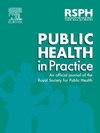Missed opportunities: The unknown impact of the COVID-19 pandemic on early childhood development in the WHO European region
IF 1.9
Q2 PUBLIC, ENVIRONMENTAL & OCCUPATIONAL HEALTH
引用次数: 0
Abstract
Background
Early childhood experiences can promote or adversely affect children's development and wellbeing with lifelong impact. The COVID-19 pandemic disrupted children's and families' lives worldwide. It is important to understand the effect on early childhood development. We aimed to examine what is known about the impact of the COVID-19 pandemic, and the related public health measures, on young children's development.
Study design
We carried out a mixed-method study which included a scoping review of review-level evidence about early childhood development over the course of the pandemic compared to beforehand and a web-based survey of early childhood development data published in the WHO European Region.
Methods
A systematic search of three databases was used to identify studies, published in English, up to November 2024. Findings were synthesised narratively by developmental domain. A web-based search was used to identify, routinely collected, national surveillance child development data in the WHO European Region. To illustrate the potential role of routine surveillance in the timely identification of developmental concerns, trend data from Scotland was examined.
Results
Seven reviews met the inclusion criteria. Most studies examined young children's mental health, while others assessed language development, mother-child bonding, and broader developmental outcomes. Findings were inconsistent, with some studies reporting adverse effects, with others finding no significant changes. There were significant gaps in the availability of national surveillance child development data in WHO European Region countries. Scottish surveillance data identified increases in developmental concerns, which affected disadvantaged groups more.
Conclusions
The available evidence about the effect of the COVID-19 pandemic, and related public health measures, on early childhood development is limited and inconclusive. Strengthening data collection and reporting across the WHO European Region is essential for timely and accurate assessment of developmental outcomes and to guide policy development.
错失的机会:COVID-19大流行对世卫组织欧洲区域儿童早期发展的未知影响
童年经历对儿童的发展和幸福有促进或负面影响,影响终身。2019冠状病毒病大流行扰乱了全球儿童和家庭的生活。了解对儿童早期发展的影响是很重要的。我们的目的是研究COVID-19大流行以及相关公共卫生措施对幼儿发展的影响。研究设计我们开展了一项混合方法研究,其中包括对大流行期间儿童早期发展的审查级证据进行范围审查,并与之前进行比较,并对世卫组织欧洲区域公布的儿童早期发展数据进行网络调查。方法系统检索截至2024年11月发表的英文文献。研究结果以叙事方式综合了发育领域。使用基于网络的搜索来确定世卫组织欧洲区域常规收集的国家监测儿童发展数据。为了说明常规监测在及时识别发育问题方面的潜在作用,研究了苏格兰的趋势数据。结果7篇综述符合纳入标准。大多数研究考察了幼儿的心理健康,而其他研究则评估了语言发展、母子关系以及更广泛的发展结果。研究结果并不一致,一些研究报告了不良反应,而另一些研究没有发现明显的变化。世卫组织欧洲区域各国在获得国家监测儿童发展数据方面存在重大差距。苏格兰的监测数据表明,发展问题有所增加,这对弱势群体的影响更大。结论COVID-19大流行及相关公共卫生措施对儿童早期发育影响的现有证据有限且不确定。加强整个世卫组织欧洲区域的数据收集和报告对于及时准确地评估发展成果和指导政策制定至关重要。
本文章由计算机程序翻译,如有差异,请以英文原文为准。
求助全文
约1分钟内获得全文
求助全文

 求助内容:
求助内容: 应助结果提醒方式:
应助结果提醒方式:


